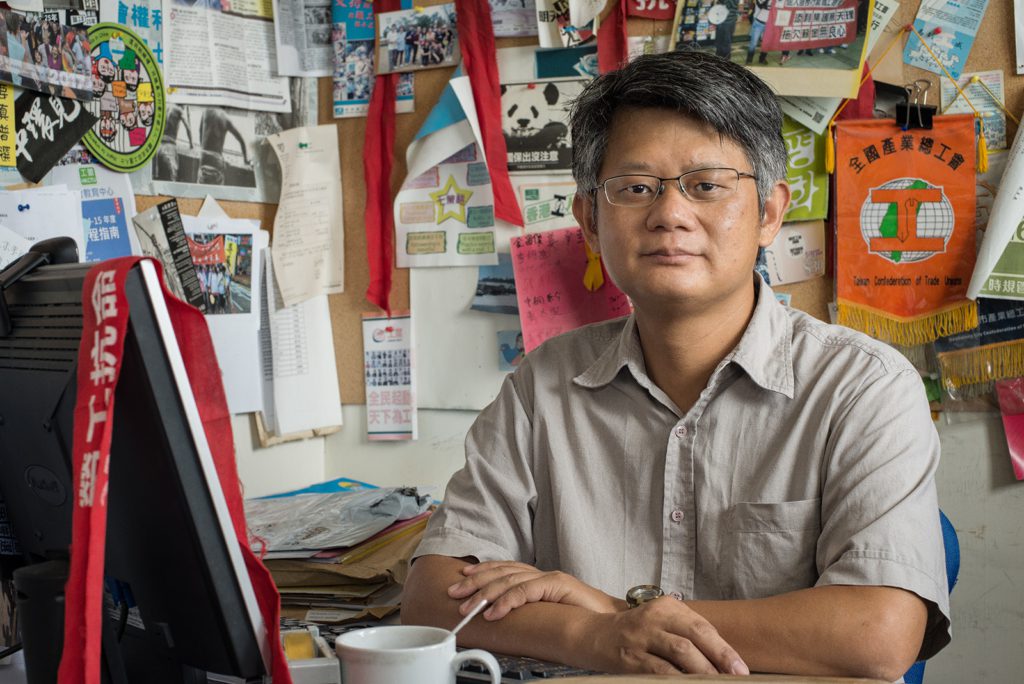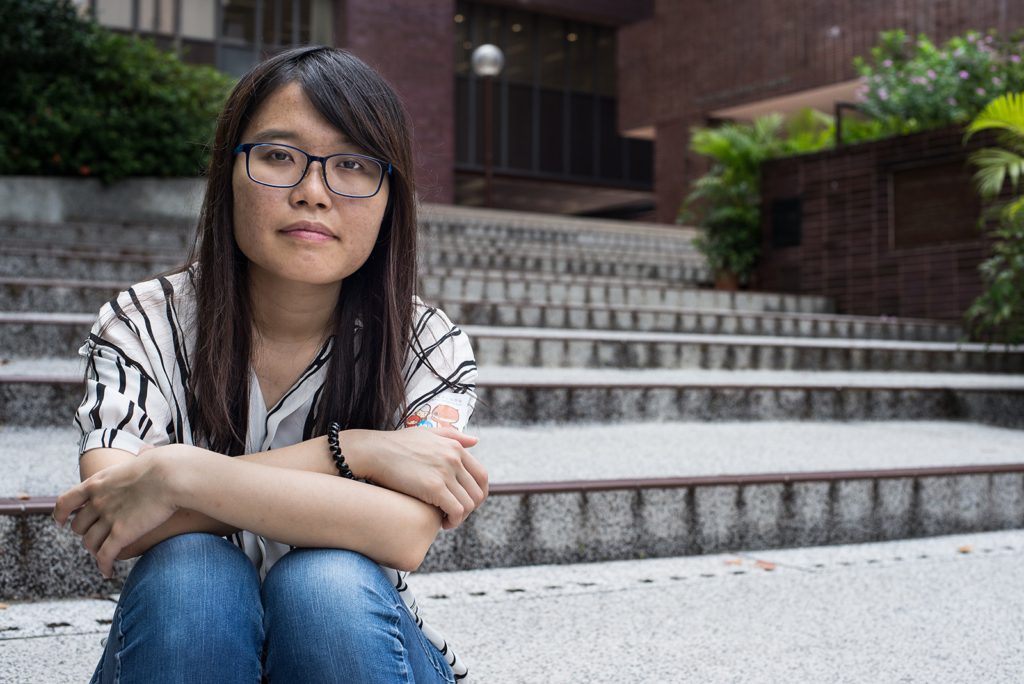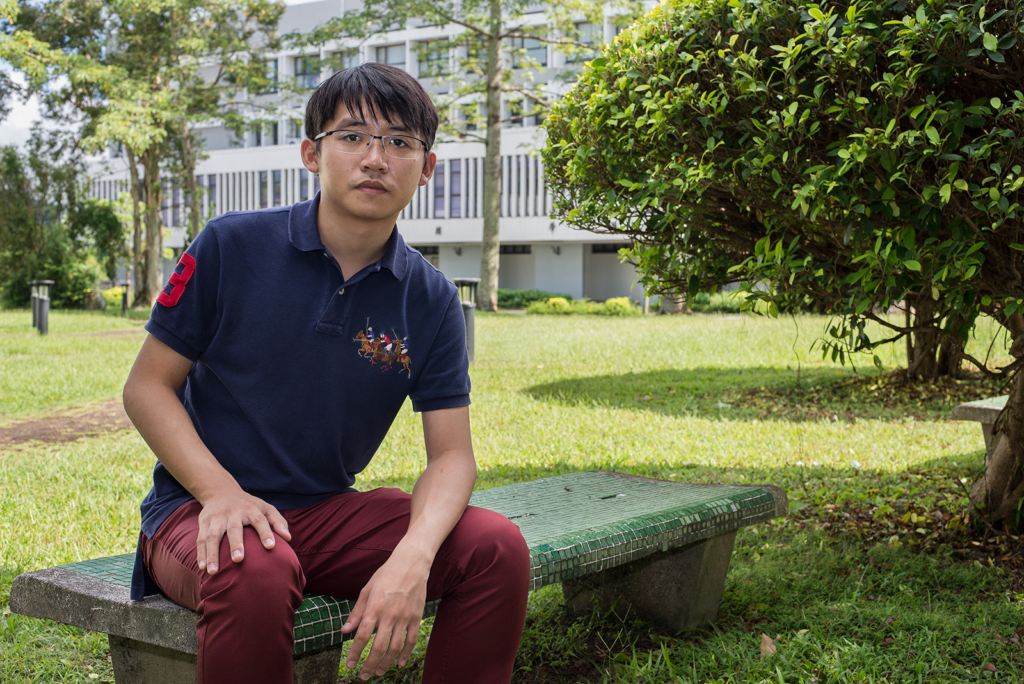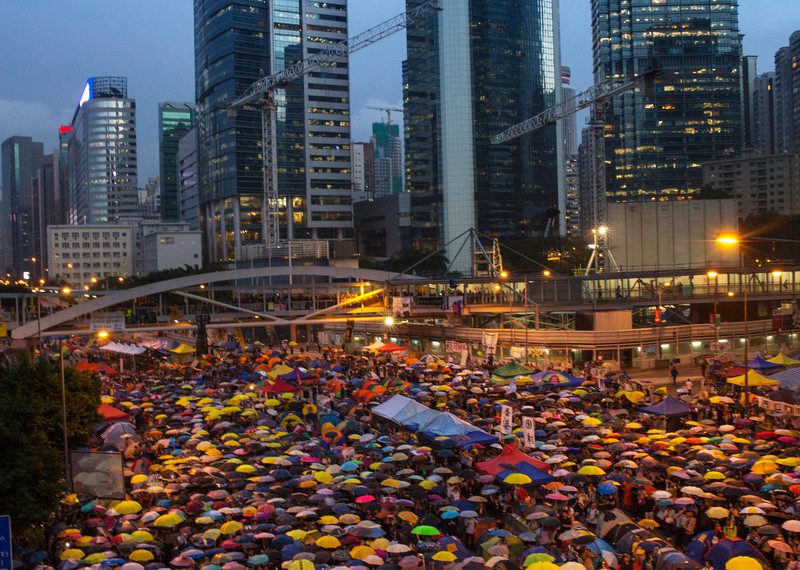On 28 September 2014, tens of thousands of people took to the streets of Hong Kong to call for democratic reforms in the city. The 79-day protest occupied key districts of central Hong Kong and became known as the Umbrella Movement.
Three years on, the Hong Kong government is toughening its stance against those involved. In August, student leaders Joshua Wong, Alex Chow and Nathan Law were handed jail terms of between six to eight months for their roles in a rally that triggered the Umbrella Movement, after the authorities sought harsher sentences.
Scores of other protesters, who were arrested for their involvement in the overwhelmingly peaceful demonstration, remain in legal limbo, uncertain whether they will face charges.
Here four activists, who were at the forefront of the Umbrella Movement, tell their stories.
Johnson Ching-Yin Yeung, 25, Head of Fundraising Team, Network of Young Democratic Asians

It would be an understatement to say that Johnson Ching-Yin Yeung is devoted to his political work. A pro-democracy activist since his college days, he has been associated with half-a-dozen local and international civil society organizations since the Umbrella Movement, continuing to fight for democracy in Hong Kong and across Asia.
“It is obvious that the government is trying to silence the younger generation by pursuing Joshua Wong, Nathan Law and Alex Chow, three years after the Umbrella Movement.
“Many of the young protesters imprisoned recently are my friends. I’ve known them since I was a student. I’m sad and upset that they have lost their freedom. They’re imprisoned for a common cause. They fought for the public good and many of us participated in the movement too. Why are they the only ones locked up behind bars?
The government is trying to silence the younger generation… when most young activists are locked away, who'll be pushing for reforms in society?
Johnson Ching-Yin Yeung, NGO Campaigner
“I’m not worried about being charged. Student groups emphasized that participants must understand the consequences of their actions when we prepared for the acts of civil disobedience before the Umbrella Movement. I’m mentally prepared to be charged or sentenced, these are predictable outcomes.
“The police brutality, the arrests and selective charges, the lengthy legal process and disproportionate sentences are having a chilling effect on the general public. We have to be more careful now.
“My concern is when most young activists are locked away, who’ll be pushing for reforms in this society? There’s always been a lack of manpower when it comes to social issues. They take one of us away, they take one part of our force away.”
Mung Siu Tat, 45, Chief Executive of Hong Kong Confederation of Trade Unions

A veteran activist, Mung Siu Tat has been advocating for labour rights and democracy in Hong Kong for most of his life. He joined the Umbrella Movement to push for universal suffrage, a change he feels would lead to a more just representation of workers in government.
“At the moment, the government is trying to deter activists by carrying out politically motivated prosecutions. In return, people will start to self-censor and restrain their actions, allowing the government to gain control over society. In such a political climate, there are things we have to stand by. If we back down, the people in power will intensify measures that will further restrict your freedom.
It’s as if we’re standing on the same spot, but the soil is being washed away.
Mung Siu Tat, Chief Executive of Hong Kong Confederation of Trade Unions
“To combat this mentality, all sections of society must stand firm. I’ll not stop organizing strikes or demonstrations, but as organizers, we also have a responsibility to inform participants of the risks and consequences of their actions.
“Before the Umbrella Movement, we took our freedom of expression and peaceful assembly for granted. Since 2014, the political climate has, and continues to, change rapidly. Things we thought were a given are no longer the norm. It’s as if we’re standing on the same spot, but the soil is being washed away and we can’t steady ourselves anymore.”
Yvonne Leung, 24, Part time student and paralegal

During the Umbrella Movement, Yvonne Leung Lai Kwong was one of the key student leaders known to the public. Nowadays, Leung is a part time law student.
“I was rather calm when the Department of Justice decided to appeal for harsher sentences for the trio (Joshua Wong, Nathan Law and Alex Chow), but what was unsettling to me was how the court handled the appeal.
It is more difficult to organize mass scale protests, we need to consider that all of those taking part could be arrested.
Yvonne Leung, paralegal and law student
“This incident didn’t follow with any previous pattern, but I believe it’ll be the beginning of a new trend. In the past, the courts acquiesced and did not sufficiently protect our rights of freedom of expression and peaceful assembly. This time the court went further, it was arguably actively involved in imposing unreasonable restrictions on our rights.
“It is more difficult to organize mass scale protests, we need to consider that all of those taking part could be arrested. What is the extent of my freedom? If I continue my work as an activist on the front-line, I could become one of those who are prosecuted, my case is used by the government to tighten its grip on our freedom of expression and peaceful assembly.”
Gary Fong, 25, Teaching Assistant at the Chinese University of Hong Kong

Bespectacled and dressed in a blue polo shirt, Gary Fong blends right in with the academics at Chinese University of Hong Kong. He has retreated from the front-line of pro-democracy movements after graduating from university. Fong now dedicates most of his time researching police power in Hong Kong, a mission that he believes is crucial to the on-going social activism in Hong Kong.
“The government wanted to send a message that protestors must answer for their actions and the consequences will be harsher than ever. I believe the core group of activists will stay determined and stand their ground. The government’s actions will also spur others who were less politically involved to take up active roles in civil society because their voices are suppressed.
“The growing political polarization in Hong Kong society will squeeze the centre-ground. There’ll be more conflicts as the two separate groups [pro-democracy and Beijing loyalists] head in different directions.
“The Umbrella Movement was a series of peaceful protests that mobilized hundreds of thousands of Hong Kongers to occupy the streets, but still the government refuses to hear our demands. As an activist, you have no choice but to contemplate how to move on from that.”
Hope lies in the people
A line popularized during the Umbrella Movement and quoted by Mung and Fong when they spoke to Amnesty—“hope lies in the people; change begins with resistance” reminds the city’s activists to stay optimistic during these dark, ever-changing times.


